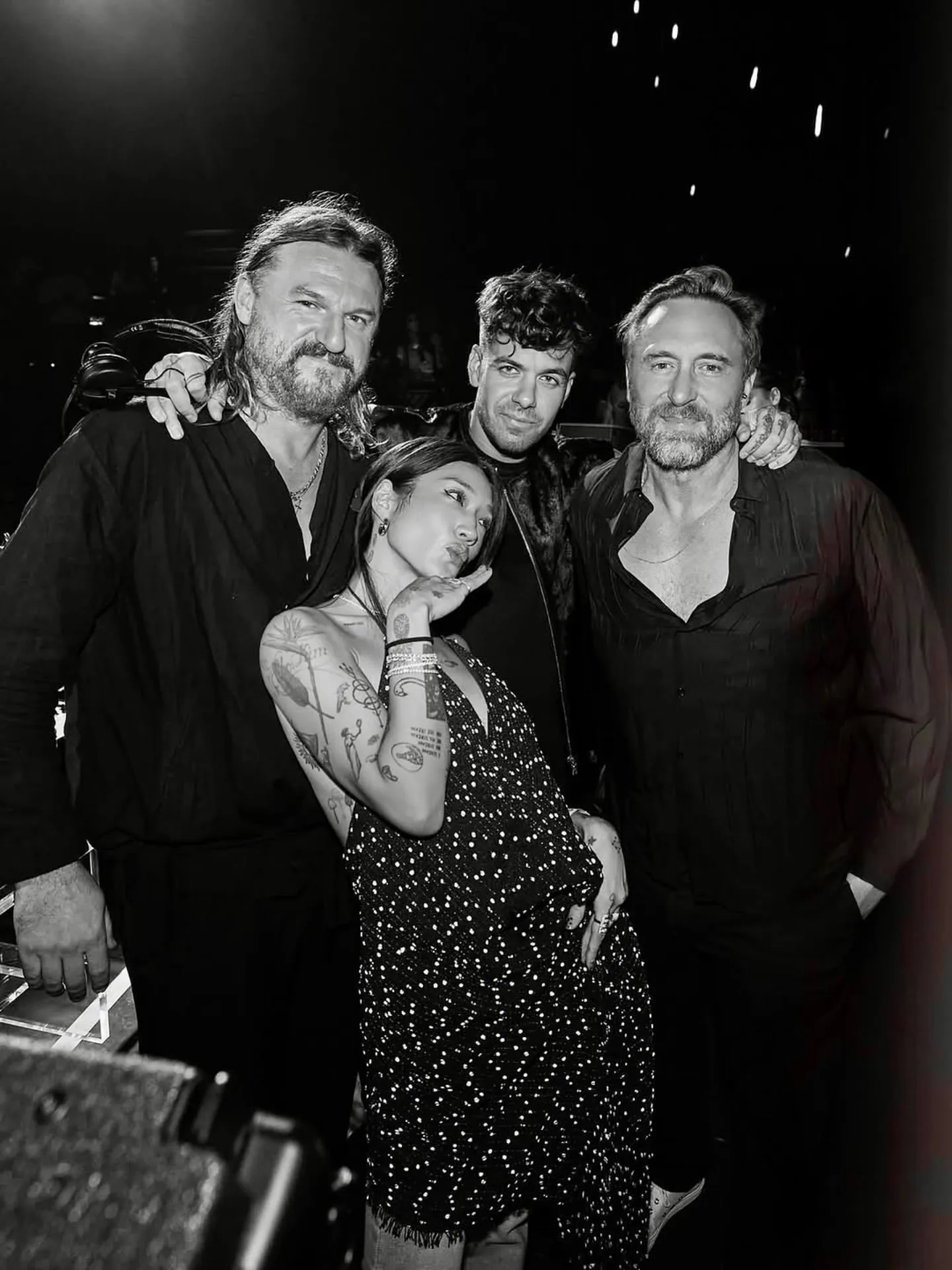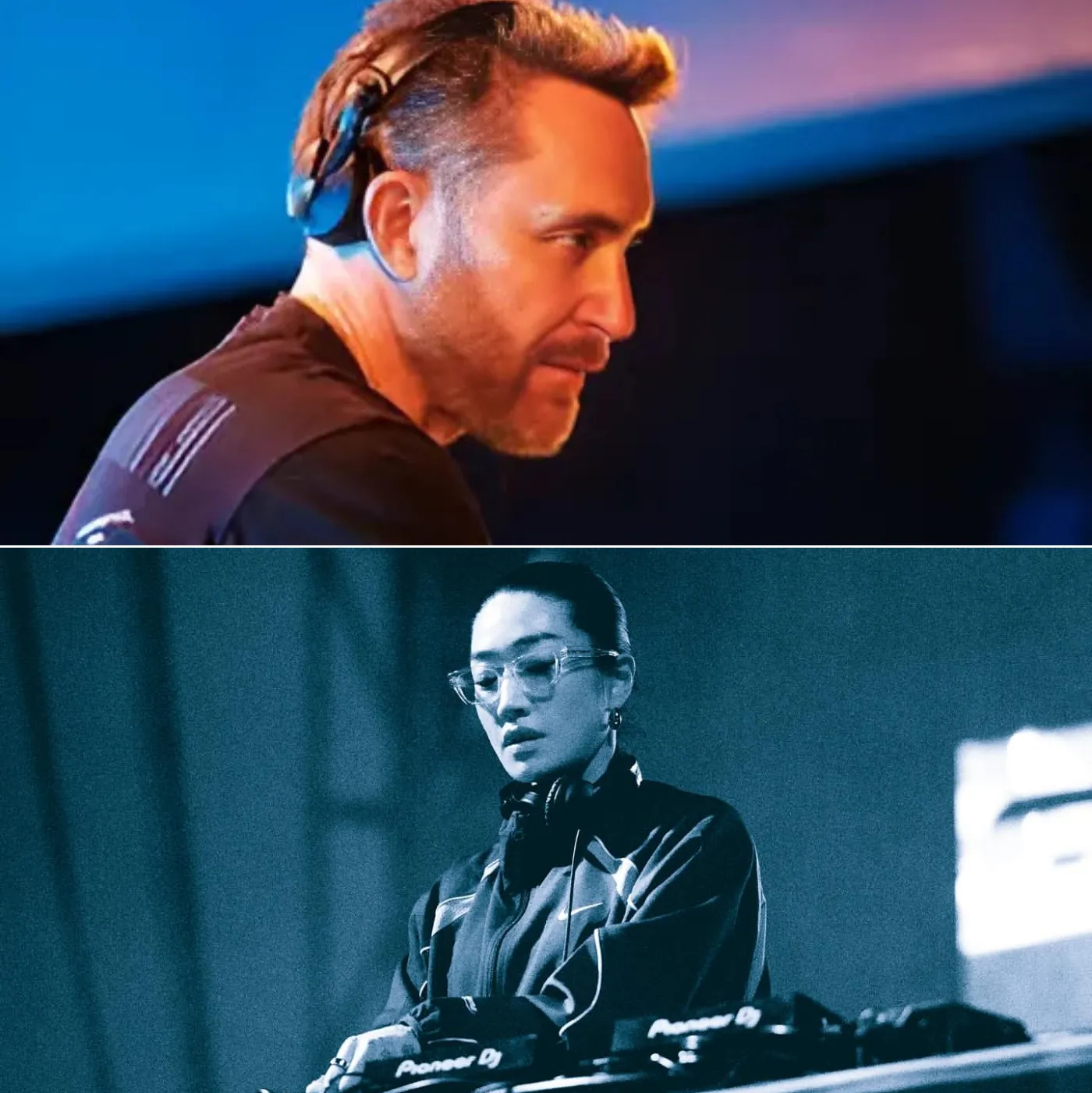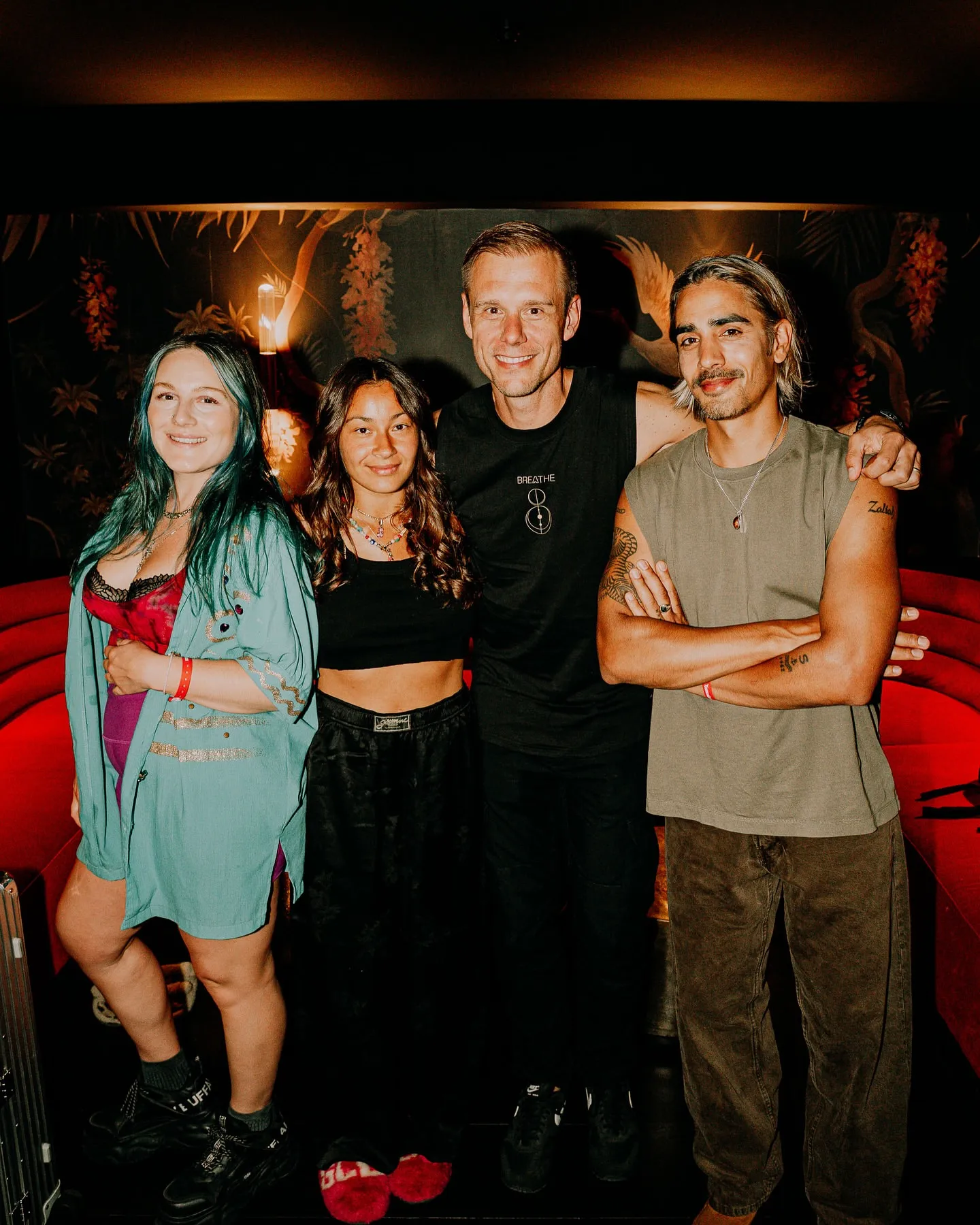

How influential is this female DJ that David Guetta prioritized to collaborate with at the Ushuaïa Ibiza event?
When David Guetta posts a backstage photo on his official Instagram, it’s never just a casual snapshot. This time, however, the image sent shockwaves across the global electronic music community. Captured in the buzzing atmosphere behind the decks at Ushuaïa Ibiza, one of the world’s most iconic open-air clubs, the photo showed Guetta standing shoulder to shoulder with Peggy Gou, the South Korean DJ and producer whose meteoric rise has turned her into one of the most influential female artists in the electronic scene. Alongside them were powerhouse names like Solomun and Anyma, making it more than a photo—it was a symbol.
The caption read: “Nowhere else but @unvrsibiza 🌿 Summer 2025 @anyma’s night is sick! @peggygou_ @solomun.” On the surface, it looked like Guetta simply applauding a colleague’s event. But beneath the words lay a much bigger story: a strategic alignment, a recognition of changing tides in dance music, and an embrace of a new era where underground-inspired house and melodic techno are increasingly shaping the soundscape.
So, how big is Peggy Gou, and why did David Guetta make the deliberate choice to spotlight her? To answer that, we must dive into the legacy of Ushuaïa Ibiza, Guetta’s own musical evolution, Gou’s extraordinary rise, and the industry context that makes this collaboration not only logical but essential.
Ushuaïa Ibiza: More Than Just a Club
For decades, Ibiza has been the spiritual home of electronic dance music. Within that paradise, Ushuaïa Ibiza stands tall as the epicenter of high-energy, sun-drenched performances. From day-to-night parties under the Balearic sky to cutting-edge stage design, Ushuaïa has hosted virtually every global DJ superstar.
David Guetta himself has a long history with Ibiza. His “F* Me I’m Famous”** residency was one of the longest-running and most successful in the island’s history. His association with the venue helped cement his status not just as a hitmaker, but as a cultural architect of electronic nightlife.
So when Guetta posts from Ushuaïa, it’s not trivial—it is a statement. This venue is where reputations are magnified, where careers are elevated, and where the future sound of dance music often finds its loudest echoes.
David Guetta’s Legacy and Evolution
To understand the significance of this collaboration, it’s vital to revisit who David Guetta is. With over 50 million albums and singles sold and tracks like “Titanium,” “When Love Takes Over,” and “Memories” dominating global charts, Guetta is more than just a DJ—he’s a pop culture phenomenon.
However, Guetta has also been criticized for being too mainstream, too focused on commercial EDM, and at times detached from the deeper, underground roots of electronic music. For years, his brand was synonymous with festival anthems, explosive drops, and collaborations with pop megastars like Sia, Usher, Nicki Minaj, and Justin Bieber.
But the landscape of electronic music is shifting. The rise of melodic techno, progressive house, and underground-influenced sounds is undeniable. Artists like Anyma, Solomun, and Peggy Gou are leading the charge, representing a new aesthetic that’s less about stadium fireworks and more about immersive journeys, emotional depth, and timeless grooves.
Guetta’s choice to share the stage and spotlight with Peggy Gou is therefore strategic: it signals his awareness of these changes and his ability to adapt.

Peggy Gou: The Female Powerhouse
Born in South Korea and based in Berlin, Peggy Gou has risen from underground clubs to global headliner status in under a decade. She is a trailblazer in multiple senses:
-
Musically, she blends deep house, techno, and eclectic influences, creating sets that feel both familiar and innovative.
-
Culturally, she represents a breakthrough for Asian artists and especially for female DJs in a male-dominated industry.
-
Commercially, she has become a fashion icon, collaborating with brands like Louis Vuitton and Adidas, while also launching her own label, Gudu Records.
Her track “(It Goes Like) Nanana” became a global anthem in 2023, dominating festivals, clubs, and TikTok feeds alike. Unlike typical radio-friendly EDM, the song drew from nostalgic house vibes, showing that timeless grooves can still captivate mass audiences.
Peggy Gou is not just another DJ—she is a cultural phenomenon, bridging underground credibility with mainstream appeal. That’s exactly the type of figure David Guetta would want to align with if he intends to stay ahead of the curve.
The Symbolism of the Instagram Post
The photo Guetta shared after Anyma’s summer night event at Ushuaïa wasn’t just backstage fun. It carried layered symbolism:
-
Cross-Generational Unity: Guetta, a pioneer of mainstream EDM, stands with Solomun (a titan of deep house/techno) and Peggy Gou (the face of the new generation). This was a handshake between eras.
-
Cultural Signal: By tagging Peggy Gou and Solomun, Guetta effectively endorsed their scene, signaling to his massive fanbase that these artists represent the future.
-
Rebranding Move: For Guetta, the association allows him to refresh his image—showing he’s not just about festival fireworks, but also about artistry, depth, and underground respect.
-
Peggy Gou’s Elevation: The fact that David Guetta—one of the world’s biggest DJs—puts Peggy Gou at the forefront in a caption shows how influential she has become. It is an acknowledgment of her global star power.
Audience Reactions: Fans Speak Loud
The comments under the Instagram post reveal everything: 🔥🔥🔥, 😍😍😍, “LEGENDS TOGETHER,” “Ibiza History.” Fans weren’t just excited; they were ecstatic. The electronic music community thrives on symbolic moments like this, where unexpected alliances hint at the genre’s evolving future.
Even other DJs and industry insiders commented, reinforcing the importance of the moment. Seeing Guetta, Solomun, Anyma, and Peggy Gou in one frame is like watching the Avengers assemble—it’s the convergence of different worlds for a shared purpose.
Why Peggy Gou Matters in 2025

By 2025, Peggy Gou isn’t just a popular DJ—she’s a movement. She represents:
-
Diversity in Dance Music: As a female, Asian artist, she breaks barriers in an industry that has long been dominated by Western men.
-
New Audience Connections: Her appeal stretches from underground purists to mainstream festivalgoers, from Gen Z TikTok users to veteran ravers.
-
Cultural Relevance: She’s just as likely to appear on the cover of Vogue as on the lineup of Tomorrowland, blending fashion, culture, and music seamlessly.
Her ability to move between these worlds makes her invaluable to someone like David Guetta, who thrives on mass appeal but must continuously reinvent himself.
The Shift in Dance Music
The global shift from EDM anthems to techno, house, and melodic sounds has been one of the most notable industry transformations of the past five years. Festivals are dedicating more stages to underground-inspired acts. Techno artists are headlining main stages. And audiences are craving depth, groove, and timeless energy over formulaic drops.
Guetta knows this. His Future Rave project with MORTEN already hinted at this direction, blending EDM energy with techno-inspired progressions. Now, aligning with Peggy Gou solidifies his intent to stay not just relevant, but influential in shaping this transition.
Peggy Gou’s Influence Beyond Music
Peggy Gou’s influence stretches beyond decks and dancefloors. She has become a fashion icon, working with high-end brands, appearing in campaigns, and curating her own aesthetics that blend streetwear with luxury.
This cultural capital elevates her beyond the DJ booth, making her a brand in herself. For David Guetta, standing next to Peggy Gou is not just about music—it’s about associating with cultural coolness, fashion credibility, and Gen Z relevance.

Strategic Move or Pure Musical Brilliance?
So, is Guetta’s collaboration with Peggy Gou purely about music, or is it strategy? The truth lies in both. Musically, the chemistry makes sense—Guetta’s big-room energy paired with Gou’s underground-flavored house could create powerful crossovers. Strategically, it allows Guetta to rebrand himself, tapping into the next wave of electronic trends while keeping his mainstream dominance intact.
The Future of Collaborations
If this Ushuaïa Ibiza moment is any indication, we may see actual studio collaborations between Guetta and Peggy Gou. Imagine Gou’s minimalist grooves infused with Guetta’s melodic anthems—it could bridge underground credibility with stadium-scale reach.
This could also inspire other DJs to cross boundaries more openly. The future of electronic music may no longer be about EDM vs. techno, but about fusion—where legends and newcomers, underground and mainstream, male and female artists unite to push boundaries.
Conclusion
The question was: How big is Peggy Gou that David Guetta chose to collaborate with her? The answer: big enough to redefine the landscape of dance music itself.
Her rise is not accidental—it’s a product of talent, cultural timing, and authenticity. For Guetta, aligning with Peggy Gou isn’t just a partnership; it’s a recognition that the future of electronic music belongs to artists like her.
At Ushuaïa Ibiza, in that single photo, we saw a glimpse of tomorrow: the convergence of mainstream and underground, male and female, old guard and new vanguard. For fans, it was electrifying. For the industry, it was symbolic. And for David Guetta, it was a strategic yet brilliant move that keeps him at the heart of the global conversation.
In the end, this wasn’t just about one event or one photo—it was about the future of an entire culture.


















